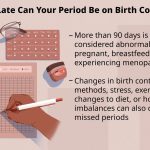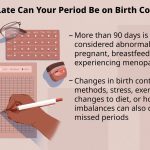Can You Miss Your Period On The Pill? Unraveling the Mystery
Have you ever taken your birth control pill, looked down at the calendar, and wondered… “Wait a minute, when was my last period again?” You’re not alone. Missing periods on the pill is a common concern that has left many women scratching their heads.
The Lowdown on Birth Control
Birth control pills have been a game-changer in the world of reproductive health. They offer reliable contraception, regulate menstrual cycles, and even help alleviate symptoms like acne and PMS. But with great power comes great responsibility – or at least, that’s what our minds might tell us when we start missing periods.
The First Question: How Does Hormonal Contraception Work?
To understand how missing periods on the pill is possible, let’s take a step back and explore how hormonal contraception works. Progestin-based pills, like mini-pills or combination pills with progestin, suppress ovulation by thickening cervical mucus and preventing fertilization. Meanwhile, estrogen helps regulate menstrual bleeding and prevents implantation of a fertilized egg.
Now that we’ve set the stage for our pill-taking adventure, let’s dive into the specifics about missing periods on hormonal contraception…
The Truth About Missing Periods on the Pill
Now that we’ve covered the basics of how hormonal contraception works, let’s tackle the main question: Can you miss your period on the pill? The answer is yes – and no. It all depends on the type of birth control pill you’re taking.
Combination pills, which contain both estrogen and progestin, are designed to regulate menstrual bleeding. As a result, most women who take combination pills will still get a period every 28 days or so, unless they have certain medical conditions or side effects. However, some progestin-only pills (mini-pills) can cause more irregularities in menstrual cycles.
According to the American College of Obstetricians and Gynecologists (ACOG), up to 40% of women taking progestin-only birth control pills will experience changes in their menstrual cycle, including skipping periods altogether. But don’t worry – this doesn’t necessarily mean you’re not getting protection from pregnancy.
Why might you miss your period on the pill? Here are some possible reasons:
- Prolonged use of progestin-only pills
- Sickness or illness that affects menstrual cycles
- Hormonal changes during menopause or perimenopause
- Certain medical conditions, such as polycystic ovary syndrome (PCOS) or thyroid disorders
- Misuse of the pill, such as skipping doses or taking it incorrectly
It’s essential to remember that missing periods on the pill doesn’t necessarily mean you’re not protected from pregnancy. If you do miss a period while taking your birth control pill, consult with your healthcare provider for guidance. They can help determine if your pill is working as intended or if there’s another explanation behind your irregular cycle.
For more information on birth control and menstrual cycles, check out the Centers for Disease Control and Prevention (CDC) Unintended Pregnancy webpage. And if you have questions or concerns about your reproductive health, don’t hesitate to reach out to a healthcare provider.
Stay Tuned for the Next Installment!
In our next post, we’ll dive deeper into the world of birth control and explore some common myths and misconceptions surrounding hormonal contraception. From spotting to breakthrough bleeding, we’ll cover it all. Stay tuned!
Can You Miss Your Period On The Pill? Unraveling the Mystery
Have you ever taken your birth control pill, looked down at the calendar, and wondered… “Wait a minute, when was my last period again?” You’re not alone. Missing periods on the pill is a common concern that has left many women scratching their heads.
The Lowdown on Birth Control
Birth control pills have been a game-changer in the world of reproductive health. They offer reliable contraception, regulate menstrual cycles, and even help alleviate symptoms like acne and PMS. But with great power comes great responsibility – or at least, that’s what our minds might tell us when we start missing periods.
The First Question: How Does Hormonal Contraception Work?
To understand how missing periods on the pill is possible, let’s take a step back and explore how hormonal contraception works. Progestin-based pills, like mini-pills or combination pills with progestin, suppress ovulation by thickening cervical mucus and preventing fertilization. Meanwhile, estrogen helps regulate menstrual bleeding and prevents implantation of a fertilized egg.
So, Can You Miss Your Period On The Pill?
Now that we’ve covered the basics, let’s get to the good stuff! Missing periods on hormonal contraception is more common than you might think. In fact, it’s estimated that up to 20% of women taking birth control pills experience irregular bleeding or missed periods.
So, what’s going on? Well, there are a few reasons why missing periods can happen:
- Breastfeeding: Hormonal changes during breastfeeding can cause irregular periods.
- Pregnancy: If you’re pregnant while taking hormonal contraception, your body will adjust by stopping menstruation until the pregnancy is confirmed.
- Hormonal Imbalance: Fluctuations in hormone levels can disrupt menstrual cycles.
- Body Type: Women with a higher body mass index (BMI) may experience irregular periods due to hormonal imbalances.
In most cases, missing periods on the pill is not cause for concern. However, if you’re experiencing other symptoms like spotting or prolonged bleeding, it’s always best to consult your healthcare provider for personalized advice.
Final Thoughts: Putting It All Together
So there you have it – a comprehensive guide to missing periods on the pill! While it may seem unsettling at first, understanding how hormonal contraception works can alleviate any concerns. Remember, it’s normal to experience irregular periods from time to time, especially with changes in body composition or hormone levels.
In conclusion, missing periods on the pill is not a reason to panic. By being aware of the reasons behind this phenomenon and consulting your healthcare provider if necessary, you can rest assured that you’re taking care of your reproductive health. Happy pill-taking, ladies!




